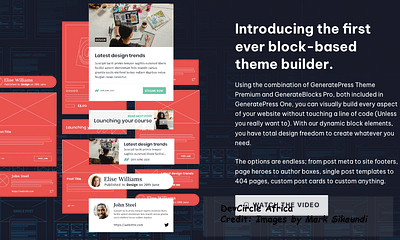Artificial Intelligence
Autobiographer’s app uses AI to help you tell your life story

Can an AI help you tell your story? That’s the idea behind a startup called Autobiographer, which leverages AI technology to engage users in meaningful conversations about the events in their lives and how they felt about them, and then turns those into prose, effectively creating your own autobiography.
The startup is dabbling in an area that’s been fraught with debate — many people have rebelled against the idea that AI could replace art, writing, and other creative endeavors. But in Autobiographer’s case, the AI guides the user to tell their own story, in their own words, then organizes that into output that can be exported as a PDF, and perhaps, one day, bound and printed as well. In other words, it works more as a collaborator rather than the sole creator.
The app may not replace professionally handwritten stories, but it could serve as a way to document family history, a friendship, or create a keepsake for your children.
Autobiographer co-founder and CEO Matt Bowman sees the app as a way to leave behind a narrative for his godchildren. Before working at Facebook in the Bay Area, Bowman previously served in the Army Special Forces, where he was deployed to Iraq and Afghanistan. As a result, he’s lived through losses that have shaped his worldview.
“I have a bunch of great stories about my friends in the military — so many funny events, so many unique and amazing events — a lot of which we heard at the funerals for some of my best friends. Now it’s my job to figure out how to synthesize those and give them to my godchildren,” Bowman says. He wants them to be able to find out more about their dad, his life in the military, and what he was like as a person.
“The technology has now come to a place where it’s possible to do this,” Bowman explains. “We can actually tell these stories, speak them verbally, and then turn them into beautiful keepsakes that we can provide to those around us.”
Bowman teamed up with James Barnes, who had also worked at Facebook through the 2016 and 2018 elections, where he was notably one of the first people to notice the issues with the data harvesting scandal Cambridge Analytica — an event that led to his involvement in several subsequent depositions and subpoenas. He later left Facebook to start a Super PAC to fight Trump. As he was playing around with OpenAI’s GPT-3, he found that artificial intelligence could help him process the things he had been through in his own life, including these milestones.
“Artificial intelligence had this incredible reflective capacity to see myself, my story, and my events,” Barnes says.
While Barnes and Bowman didn’t overlap at Facebook, they met up last year in San Francisco, as Barnes was seeking someone with military expertise to help the team (which also includes co-founders Luke Schoenfelder and Ivan Almaral) experiment with this idea of using AI for storytelling. The two bonded over their shared goals and other experiences, including their interest in psychedelic medicine.
“Exploring consciousness was a key point of connection for us,” explains Barnes. “As we work on these really tangible things, we’re also able to think about the capacity of our platform to allow people to introspect and to do more abstract, personal work,” he says.

To use the app, you engage in conversations with an AI agent, built on Anthropic technology, that prompts you to tell a story. For instance, the initial prompt may ask you to tell a story about an adventure you had, reminding you there’s no right or wrong answer. You can start speaking, pause and resume recording, or move on to another question, if you prefer.
The memories are stored in a vault, a biometrically protected, encrypted space that even Autobiographer staff can’t access.
“One of the most important values as James, Luke, Ivan, and I came together, was the obvious understanding that no one’s going to tell their cherished memories or their very emotionally sensitive stories to something that is advertised — or that a bunch of engineers can see on the backend,” says Bowman.
The app lets you revisit topics, explore your memories, and then ultimately turn them into different types of prose — like a short story or a gratitude letter for a loved one. For now, these are exported as PDFs, but the team would like to offer a printed book at some point.
Autobiographer costs $199 per year — cheaper than a ghostwriter, certainly, but also expensive enough to discourage some.
The company has now also partnered with journalist Katie Couric, who will serve as a promotional partner for the startup. Her role is still being defined, however.
The company behind Autobiographer was founded three and half years ago, but has undergone several pivots. The most recent version of the app, launching today, was started a year ago.
Autobiographer is backed by $4 million in pre-seed funding from various firms. Read more
Artificial Intelligence
The Growing Influence of AI in Education
The Impact of AI in Education
Artificial Intelligence (AI) is transforming the way we learn and teach in the education sector. With the integration of AI technology, students and teachers have access to personalized learning experiences that cater to their individual needs and preferences. Whether it’s through AI-powered tutoring systems, virtual classrooms, or adaptive learning platforms, AI is revolutionizing the way we approach education.
One of the key benefits of AI in education is its ability to provide personalized learning experiences for students. By analyzing data on student performance and behavior, AI algorithms can tailor lesson plans and exercises to each student’s individual learning style and pace. This not only helps students achieve better academic results, but also fosters a deeper understanding of the material being taught.
Furthermore, AI technology can also assist teachers in managing their classrooms more effectively. From grading papers and providing feedback to identifying areas where students may be struggling, AI tools can help educators streamline their workload and focus on delivering quality instruction. This allows teachers to spend more time engaging with students and less time on administrative tasks.
In conclusion, the growing influence of AI in education is undeniable. As technology continues to advance, it’s essential for educators to embrace AI tools and incorporate them into their teaching strategies. By leveraging AI technology, we can create more personalized and effective learning experiences for students, ultimately leading to improved academic outcomes.
The Role of AI in Shaping the Future of Education
As technology continues to advance at a rapid pace, the role of AI in education is becoming increasingly important. AI-powered tools and platforms are revolutionizing the way we teach and learn, offering new opportunities for personalized and adaptive learning experiences.
One way in which AI is shaping the future of education is through the use of virtual classrooms. With the rise of remote learning and online education, AI technology is being used to create virtual classrooms that simulate the traditional classroom experience. These virtual classrooms allow students to interact with teachers and peers in real-time, collaborate on projects, and participate in group discussions – all from the comfort of their own homes.
Another key area where AI is making a significant impact is in the development of adaptive learning platforms. These platforms use AI algorithms to analyze student performance data and adjust the curriculum to meet each student’s individual needs. By tailoring lesson plans and exercises to each student’s strengths and weaknesses, adaptive learning platforms can help students achieve better academic results and foster a deeper understanding of the material being taught.
Overall, the growing influence of AI in education is transforming the way we approach teaching and learning. By embracing AI technology, educators can create more personalized learning experiences for students, enhance their teaching effectiveness, and prepare them for success in an increasingly digital world.
The Future of AI in Education
As we look to the future, the role of AI in education will only continue to grow and evolve. From AI-powered tutoring systems to virtual classrooms and adaptive learning platforms, AI technology is reshaping the way we teach and learn.
One potential area of growth for AI in education is the development of intelligent tutoring systems that can provide students with personalized feedback and guidance. These systems use AI algorithms to analyze student performance data and identify areas where students may be struggling. By providing targeted support and resources, intelligent tutoring systems can help students overcome challenges, master difficult concepts, and achieve better academic outcomes.
Furthermore, AI technology is also being used to enhance the quality of education by automating administrative tasks for teachers. From grading papers and providing feedback to managing lesson plans and curriculum materials, AI tools can help educators streamline their workload and focus on delivering quality instruction. This allows teachers to spend more time engaging with students and less time on mundane administrative tasks.
In conclusion, the future of AI in education is bright and promising. As technology continues to advance, educators must embrace AI tools and platforms to create more personalized and effective learning experiences for students. By leveraging AI technology, we can prepare students for success in an increasingly digital world and empower them to achieve their full potential.
Artificial Intelligence
The Impact of AI in Education
The Growing Influence of AI in Education
Artificial Intelligence (AI) is revolutionizing the way students learn and educators teach in the 21st century. With advancements in technology, AI is being integrated into various aspects of education to enhance the learning experience for students. AI-powered platforms are able to provide personalized learning experiences tailored to individual student needs, track student progress, and even provide feedback in real-time. This allows educators to better understand student performance and tailor their teaching methods accordingly. The impact of AI in education is truly transformative, making learning more engaging and effective for students of all ages.
Enhancing Accessibility and Inclusivity in Education through AI
One of the key benefits of AI in education is its ability to enhance accessibility and inclusivity for all students, including those with learning disabilities or other challenges. AI-powered platforms can provide support for students with special needs by offering personalized learning tools and resources, such as audio assistance, text-to-speech capabilities, and adaptive learning modules. This helps to level the playing field and ensure that all students have equal access to quality education. Additionally, AI can help educators identify and address individual student needs more effectively, leading to improved outcomes for all learners. The impact of AI in education is not just about enhancing learning outcomes, but also about creating a more inclusive and supportive learning environment for all students.
Navigating the Challenges and Opportunities of AI in Education
While the impact of AI in education is largely positive, there are also challenges that need to be addressed in order to fully realize its potential. Privacy concerns, data security, and ethical considerations are just some of the challenges that educators and policymakers need to navigate when incorporating AI into educational settings. Additionally, there is a need for ongoing training and professional development for educators to ensure that they are equipped to effectively utilize AI tools in the classroom. Despite these challenges, the opportunities presented by AI in education are vast. From personalized learning experiences to enhanced accessibility and inclusivity, AI has the potential to revolutionize the education sector and improve learning outcomes for students around the world. By embracing AI and addressing the challenges head-on, we can create a more engaging, inclusive, and effective educational experience for all.
Artificial Intelligence
AI Powered Education Platforms
The Future of Education: AI Powered Platforms
Artificial intelligence is revolutionizing the world of education with the development of AI powered platforms. These platforms use advanced algorithms to personalize learning experiences for students, providing them with tailored lessons and feedback based on their individual strengths and weaknesses. This level of customization allows students to progress at their own pace and ensures that they are receiving the support they need to succeed.
One of the key benefits of AI powered education platforms is their ability to adapt to each student’s unique learning style. By analyzing data on how students interact with the platform, AI can identify patterns and preferences to create a personalized learning experience that is tailored to each individual. This not only improves student engagement and motivation, but also helps to maximize learning outcomes.
In addition to personalized learning, AI powered platforms also offer teachers valuable insights and data-driven recommendations to help them support their students in the most effective way. By analyzing student performance data, teachers can identify areas where students are struggling and provide targeted interventions to help them improve. This data-driven approach to teaching can lead to better student outcomes and a more efficient use of teacher resources.
Overall, AI powered education platforms have the potential to transform the way we teach and learn, offering a more personalized, adaptive, and data-driven approach to education. As the technology continues to evolve, we can expect to see even more innovative uses of AI in the education sector, creating more engaging and effective learning experiences for students around the world.
The Impact of AI in Education
Artificial intelligence is rapidly transforming the field of education, offering new opportunities to improve learning outcomes and enhance the teaching experience. AI powered education platforms are revolutionizing the way we teach and learn by providing personalized, data-driven insights that help students and teachers achieve their full potential.
One of the key benefits of AI in education is its ability to personalize learning experiences for students. By analyzing data on student performance and behavior, AI can identify individual learning needs and preferences to create customized lessons and activities that cater to each student’s unique strengths and weaknesses. This level of personalization not only improves student engagement and motivation, but also leads to better learning outcomes.
In addition to personalization, AI powered education platforms also offer teachers valuable insights and recommendations to help them support their students more effectively. By analyzing data on student performance, AI can identify areas where students are struggling and provide targeted interventions to help them improve. This data-driven approach to teaching can help teachers optimize their teaching strategies and resources to ensure that each student is receiving the support they need to succeed.
Overall, AI is having a profound impact on education, offering a more personalized, adaptive, and data-driven approach to teaching and learning. As the technology continues to evolve, we can expect to see even more innovative applications of AI in education, helping to create a more engaging and effective learning experience for students around the world.
The Future of Learning: AI Powered Education Platforms
As technology continues to advance at a rapid pace, AI powered education platforms are poised to revolutionize the way we teach and learn. These platforms leverage the power of artificial intelligence to provide personalized, adaptive, and data-driven learning experiences that cater to the individual needs of each student.
One of the most exciting aspects of AI powered education platforms is their ability to create customized learning pathways for students. By analyzing data on student performance and behavior, AI can identify areas where students are struggling and provide targeted interventions to help them improve. This personalized approach to learning not only enhances student engagement and motivation, but also leads to better learning outcomes.
In addition to personalization, AI powered education platforms also offer teachers valuable insights and recommendations to help them optimize their teaching strategies. By analyzing data on student performance, AI can identify patterns and trends that can help teachers better understand their students’ learning needs and preferences. This data-driven approach to teaching can help teachers tailor their instruction to meet the individual needs of each student, leading to a more effective and efficient learning experience.
Overall, AI powered education platforms have the potential to transform the way we teach and learn, offering a more personalized, adaptive, and data-driven approach to education. As these platforms continue to evolve, we can expect to see even more innovative applications of AI in the classroom, creating a more engaging and effective learning experience for students of all ages.
-
SEO11 months ago
How to Increase Conversion Rate in 2024: 15 Effective Strategies
-
GamersX11 months ago
Call of Duty: Black Ops 6 Officially Announced, Full Reveal on June 9
-
WordPress10 months ago
GeneratePress 3
-
SEO11 months ago
What is SEO and how it works
-
SEO10 months ago
Tips for Successful SEO Optimization for Personal Trainers
-
SEO11 months ago
Is Google Keyword Planner worth it?
-
SEO11 months ago
Which is better, Google Keyword Planner or SEMrush?
-
WordPress10 months ago
Free WordPress Themes 2024















